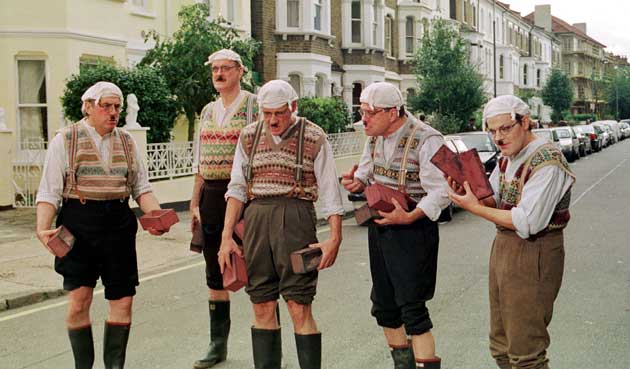Sir Bill Cotton, BBC's king of light entertainment, dies at the age of 80

Your support helps us to tell the story
From reproductive rights to climate change to Big Tech, The Independent is on the ground when the story is developing. Whether it's investigating the financials of Elon Musk's pro-Trump PAC or producing our latest documentary, 'The A Word', which shines a light on the American women fighting for reproductive rights, we know how important it is to parse out the facts from the messaging.
At such a critical moment in US history, we need reporters on the ground. Your donation allows us to keep sending journalists to speak to both sides of the story.
The Independent is trusted by Americans across the entire political spectrum. And unlike many other quality news outlets, we choose not to lock Americans out of our reporting and analysis with paywalls. We believe quality journalism should be available to everyone, paid for by those who can afford it.
Your support makes all the difference.Sir Bill Cotton, the former BBC executive who oversaw classic shows including Monty Python's Flying Circus, Morecambe And Wise and The Two Ronnies, has died aged 80.
Sir Bill, the son of the wartime big-band leader Billy Cotton, retired in 1987 as the corporation's managing director of television. He had spent four years as controller of BBC1, but arguably made his greatest mark as head of light entertainment, a post he held from 1970 to 1977.
Last night, British television legends paid tribute to a man who was not only a passionate advocate for light entertainment but also had a golden touch for developing popular hits which enjoyed huge success.
Bruce Forsyth told how Sir Bill was the man who suggested he should host The Generation Game, which went on to draw audiences of 20 million. "The more he spoke to me about it, the more I realised he had a wonderful idea for a light entertainment show," Forsyth told the BBC. "He wanted me to do it very badly and it changed my life." The Generation Game began in 1971, with Forsyth, who said Sir Bill had become a "very dear friend", at the helm for six years.
Sir Bill "knew how to treat performers how to get them to do things even if they didn't want to," added Forsyth, 80. "He knew what the public wanted and gave the public what they wanted. It is a very sad day."
David Croft, who with Jimmy Perry wrote Dad's Army, described Sir Bill as the "master jeweller" in the "golden age of television" and said he had been a "wonderful boss" who had trusted the instincts of his producers. This included facing down opposition to the production of the Home Guard comedy, which some feared would cause offence. In fact, Dad's Army ran from 1968-77, extending to 80 episodes. During the 1970s, it regularly attracted an audience of 18 million.
"Without Bill I don't think the show would have gone on," Mr Croft said. "He undoubtedly had a nose for a hit. He was a showman and there's not many of his type about. I loved him."
Sir Bill also had a sense of humour – in a letter to The Times in 2002, protesting over a television preview which accused him of thumping a colleague, he wrote: "I did not hit Eddie Braben, the writer of The Morecambe And Wise Show, with a soda siphon. My daughter collects them and I treat them as an endangered species. In the interests of the BBC, I did however hit him behind his writing ear with a Ping 9-iron. It had the desired effect. He never wrote for Morecambe And Wise for ITV as well as he did for the BBC."
Speaking in 2000, Sir Bill laid out the philosophy that had underpinned his tenure at the corporation. "One of the reasons that the care taken on light entertainment had to be the same care as was taken for ballet, or opera, or serious drama is because you are contributing to the culture of the country. I think it's sad if it isn't," he said.

Watch Apple TV+ free for 7 days
New subscribers only. £8.99/mo. after free trial. Plan auto-renews until cancelled

Watch Apple TV+ free for 7 days
New subscribers only. £8.99/mo. after free trial. Plan auto-renews until cancelled
"Basically, television was a performer's medium and news and current affairs were the sideshow."
In 1986, he announced the launch of all-day television on the BBC, saying: "It did not seem proper to take a licence fee and give no service to a section of the audience, many of whom were the very people who find the licence fee quite an item in their expenditure – old age pensioners, the unemployed and the shift workers.
In 1998, the British Academy of Film and Television Arts awarded Sir Bill its highest accolade, the Academy Fellowship. He died in hospital in Bournemouth.
Join our commenting forum
Join thought-provoking conversations, follow other Independent readers and see their replies
Comments